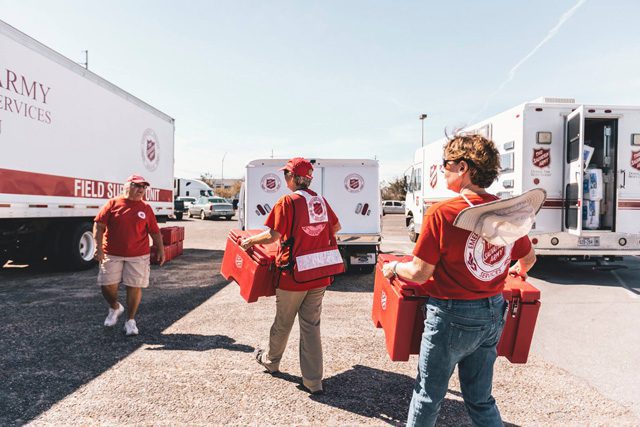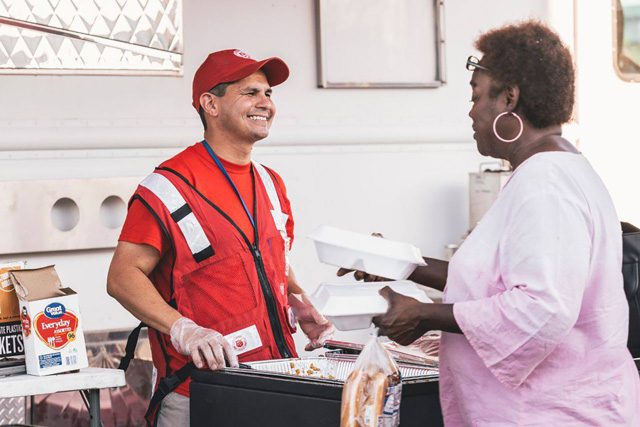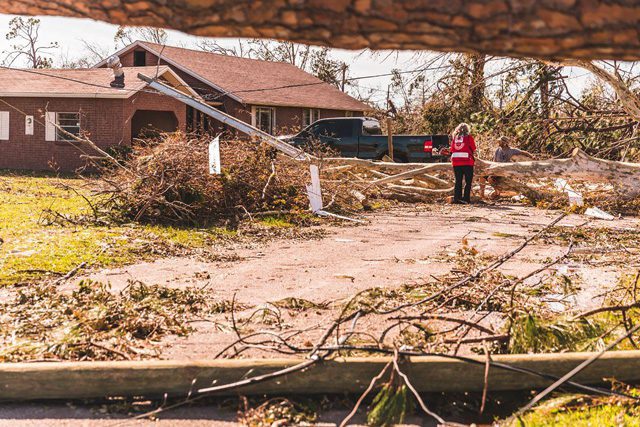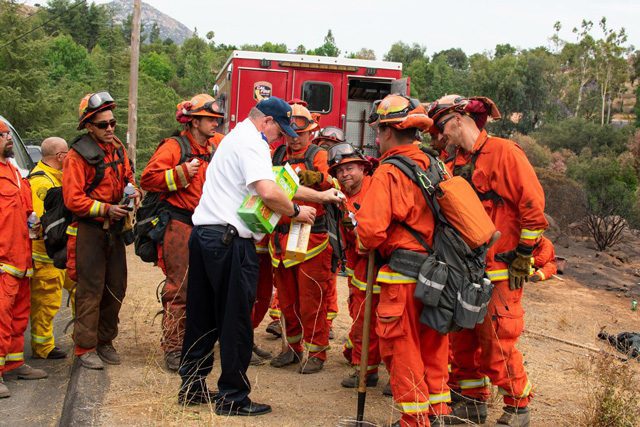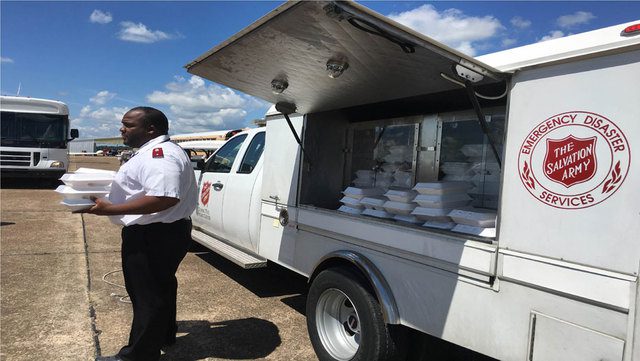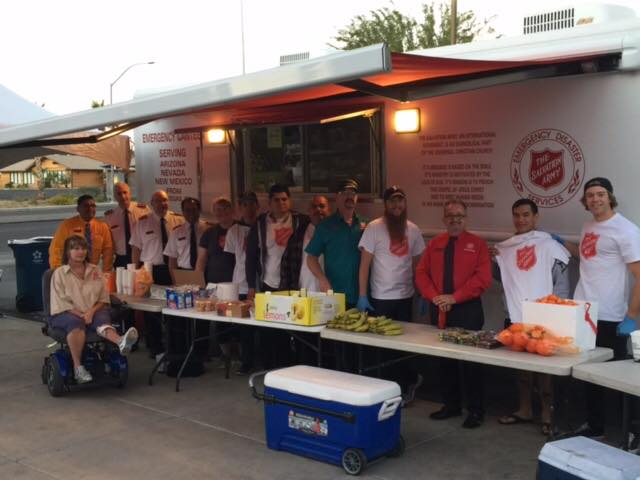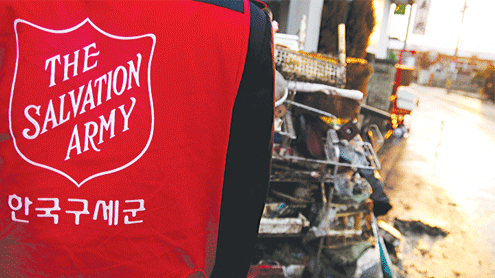Listen to this article
Listen to this article
Loading
Play
Pause
Options
0:00
-:--
1x
Playback Speed- 0.5
- 0.6
- 0.7
- 0.8
- 0.9
- 1
- 1.1
- 1.2
- 1.3
- 1.5
- 2
Audio Language
- English
- French
- German
- Italian
- Spanish
Open text
how the salvation army helps the community after a disaster. emergency disaster services. the salvation army began offering assistance to disaster survivors after a major hurricane hit galveston, texas in september 1900, destroying the coastal city and killing thousands of people. at the request of the salvation army’s national commander, commissioner frederick booth-tucker, officers from across the country moved into the galveston area to help feed and shelter thousands of survivors, while also providing much needed emotional and spiritual support. since then, the salvation army has responded to natural disasters, transportation accidents, civil unrest situations and terrorist attacks. by providing beverages, meals and emotional and spiritual care to first responders and survivors, the salvation army strives to bring hope and healing to people who find themselves in the midst of extremely difficult situations. while each disaster creates its own unique circumstances and special needs, salvation army disaster relief efforts focus on seven core services. these services may be modified based on the magnitude of the disaster and adapted to meet the specific needs of individual survivors. training. the first step in being ready to respond to an emergency is training. in partnership with other agencies, the salvation army’s disaster training program offers a variety of courses designed to help individuals and communities prepare for emergency events and become trained disaster volunteers. food service. when disaster strikes, one of the first signs that help is on the way is often the arrival of a salvation army mobile feeding unit, offering meals, snacks and drinks to rescue workers and survivors. emotional and spiritual care. motivated by christian faith, the salvation army deploys specially trained individuals to offer emotional and spiritual care to rescue workers and disaster survivors. emergency communications. the salvation army team emergency radio network (satern) includes a worldwide network of volunteer amateur radio operators and other communications specialists, who may be mobilized to transmit emergency information during a disaster event. disaster social services. after a family has lost everything in a disaster, the salvation army is there to provide emergency assistance to help meet survivors’ most urgent needs for food, clothing, shelter and medical services. donations management. the salvation army is one of the nation’s leaders in responsibly collecting, sorting and distributing donated goods. the salvation army encourages cash donations as the best and most flexible way to help and solicits only those in-kind donations that can be effectively received and efficiently distributed. recovery. the salvation army supports long-term disaster recovery operations with flexible programming that is adaptable to the unique needs of individual communities. find out more including how to volunteer with salvation army emergency disaster services by visiting disaster.salvationarmyusa.org.
Open context player
Close context player
Plays:-Audio plays count
how the salvation army helps the community after a disaster. emergency disaster services. the salvation army began offering assistance to disaster survivors after a major hurricane hit galveston, texas in september 1900, destroying the coastal city and killing thousands of people. at the request of the salvation army’s national commander, commissioner frederick booth-tucker, officers from across the country moved into the galveston area to help feed and shelter thousands of survivors, while also providing much needed emotional and spiritual support. since then, the salvation army has responded to natural disasters, transportation accidents, civil unrest situations and terrorist attacks. by providing beverages, meals and emotional and spiritual care to first responders and survivors, the salvation army strives to bring hope and healing to people who find themselves in the midst of extremely difficult situations. while each disaster creates its own unique circumstances and special needs, salvation army disaster relief efforts focus on seven core services. these services may be modified based on the magnitude of the disaster and adapted to meet the specific needs of individual survivors. training. the first step in being ready to respond to an emergency is training. in partnership with other agencies, the salvation army’s disaster training program offers a variety of courses designed to help individuals and communities prepare for emergency events and become trained disaster volunteers. food service. when disaster strikes, one of the first signs that help is on the way is often the arrival of a salvation army mobile feeding unit, offering meals, snacks and drinks to rescue workers and survivors. emotional and spiritual care. motivated by christian faith, the salvation army deploys specially trained individuals to offer emotional and spiritual care to rescue workers and disaster survivors. emergency communications. the salvation army team emergency radio network (satern) includes a worldwide network of volunteer amateur radio operators and other communications specialists, who may be mobilized to transmit emergency information during a disaster event. disaster social services. after a family has lost everything in a disaster, the salvation army is there to provide emergency assistance to help meet survivors’ most urgent needs for food, clothing, shelter and medical services. donations management. the salvation army is one of the nation’s leaders in responsibly collecting, sorting and distributing donated goods. the salvation army encourages cash donations as the best and most flexible way to help and solicits only those in-kind donations that can be effectively received and efficiently distributed. recovery. the salvation army supports long-term disaster recovery operations with flexible programming that is adaptable to the unique needs of individual communities. find out more including how to volunteer with salvation army emergency disaster services by visiting disaster.salvationarmyusa.org.
Listen to this article











